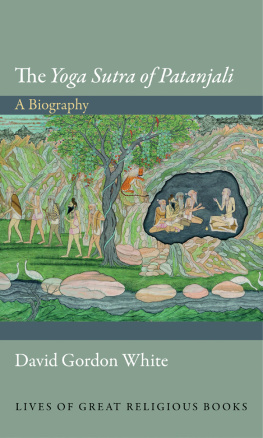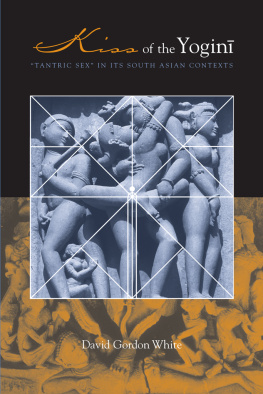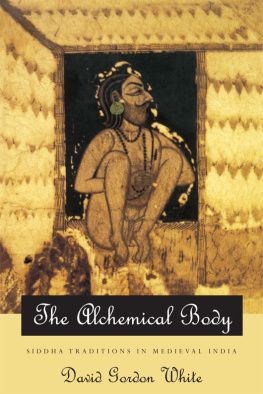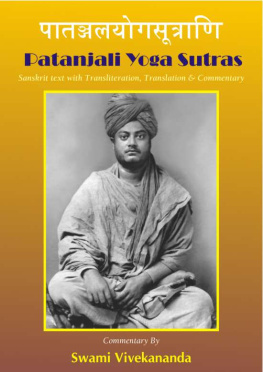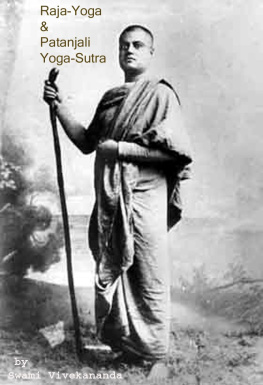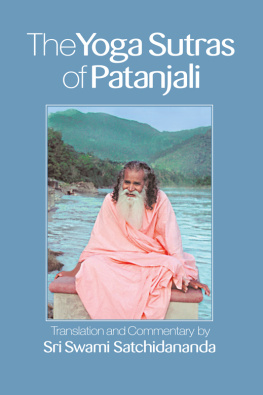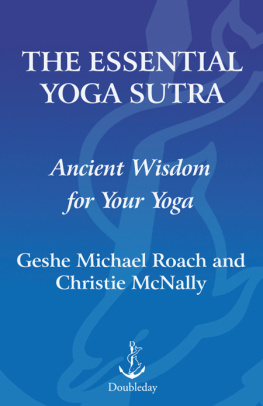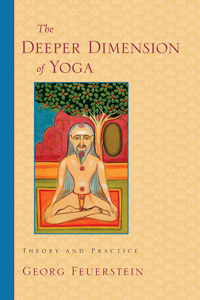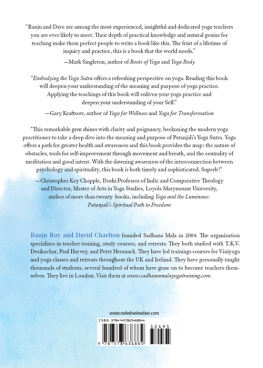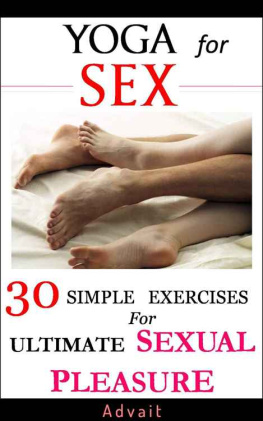
LIVES OF GREAT RELIGIOUS BOOKS
The Yoga Sutra of Patanjali
LIVES OF GREAT RELIGIOUS BOOKS
The Dead Sea Scrolls, John J. Collins
The Book of Mormon, Paul C. Gutjahr
The Book of Genesis, Ronald Hendel
The Book of Common Prayer, Alan Jacobs
The Book of Job, Mark Larrimore
The Tibetan Book of the Dead, Donald S. Lopez Jr.
Dietrich Bonhoeffers Letters and Papers from Prison, Martin E. Marty
Thomas Aquinass Summa Theologiae, Bernard McGinn
The I Ching, Richard J. Smith
The Yoga Sutra of Patanjali, David Gordon White
Augustines Confessions, Garry Wills
FORTHCOMING:
The Book of Revelation, Timothy Beal
Confuciuss Analects, Annping Chin and Jonathan D. Spence
The Bhagavad Gita, Richard H. Davis
Josephuss Jewish War, Martin Goodman
John Calvins Institutes of the Christian Religion, Bruce Gordon
The Lotus Sutra, Donald S. Lopez Jr.
C. S. Lewiss Mere Christianity, George Marsden
The Greatest Translations of All Time: The Septuagint and the Vulgate, Jack Miles
The Passover Haggadah, Vanessa Ochs
The Song of Songs, Ilana Pardes
The Daode Jing, James Robson
Rumis Masnavi, Omid Safi
The Talmud, Barry Wimpfheimer
The Yoga Sutra of Patanjali
A BIOGRAPHY
David Gordon White
PRINCETON UNIVERSITY PRESS
Princeton and Oxford
Copyright 2014 by Princeton University Press
Published by Princeton University Press, 41 William Street,
Princeton, New Jersey 08540
In the United Kingdom: Princeton University Press, 6 Oxford Street,
Woodstock, Oxfordshire OX20 1TW
press.princeton.edu
Jacket illustration: Purkhu, The Five Siddhas Make Their Way to the Kailasha Mountains, opaque watercolor on paper, ca. 1820, 14 1/4 in. x 19 11/32 in. (36.2 cm x 49.1 cm), Edward Binney 3rd Collection, the San Diego Museum of Art, 1990.1250, http://www.sdmart.org
The Swami Shankarananda poem that appears in chapter 1 is reprinted by permission from Yoga Philosophy of Patanjali, by Swami Aranya Hariharananda, the State University of New York Press 1984, State University of New York. All Rights Reserved.
All Rights Reserved
ISBN 978 0-691 14377 4
British Library Cataloging-in-Publication Data is available
This book has been composed in Garamond Premier Pro
Printed on acid-free paper.
Printed in the United States of America
10 9 8 7 6 5 4 3 2 1
DRAMATIS PERSONAE
Alberuni, also known as Abu al-Rayhan Muhammad ibn Ahmad al-Biruni (9731048). A renowned Muslim scientist and court scholar, in 1017 Alberuni was taken by force to India where he authored a learned account of Indian science, culture, and religion titled the Tahqiq-i-Hind (India), as well as an Arabic translation of a now lost commentary on the Yoga Sutra, known today as the Kitab Patanjal (Patanjalis Book).
Aranya, Hariharananda (18691947). The author of the most highly regarded twentieth-century commentary on the Yoga Sutra, the 1911 Bengali-language Bhasvati (Dawning Sun), Aranya was also the founder of the Kapil Math monastery in modern-day Jharkand state, where at his request he was sealed into a cave in 1926. He remained there until his death in 1947.
Bhoja, also known as Bhojaraja, Bhojadeva, and Raja Bhoja (eleventh century). The king of the west central Indian kingdom of Malava. Bhoja was the author of the Rajamartandavritti (Royal Sun Commentary) on the Yoga Sutra. An enlightened despot, he was also a prolific scholar, patron of the arts, military strategist, and hydraulic engineer.
Blavatsky, Madame Helena Petrovna (18311891). Russian-born cofounder of the Theosophical Society and prolific spiritualist author, Blavatsky popularized Yoga in the West by fusing principles and terminology from the Yoga Sutra and other works on Yoga with the Western spiritualist ideas of animal magnetism, harmonial religion, and the occult.
Colebrooke, Henry Thomas (17651837). British Orientalist and cofounder of the Royal Asiatic Society, Colebrooke authored the earliest English-language scholarly study of the Yoga Sutra in 1823. His massive collection of Sanskrit manuscripts, donated in 1818, formed the core of the India Office Librarys original manuscript holdings.
Eliot, T. S. (18881965). Eliot, who read Sanskrit with James Haughton Woods at Harvard in 191112, became fascinated with the Yoga Sutra and incorporated its teachings into his psychology of reading and writing as well as, perhaps, into the opening verses of his 1922 masterwork, The Waste Land.
Hegel, Georg Wilhelm Friedrich (17701831). German Idealist philosopher who adapted Colebrookes study of the Yoga Sutra into his world history of philosophy. For Hegel, Patanjalis Yoga system epitomized the Indian mind, which for him was prephilosophical, mired in a sort of dreamlike consciousness. Behind his cavalier use of Colebrooke, Hegels critique of the Yoga Sutra was especially a means for him to settle scores with the German Romantics, for whom ancient India was the fountainhead of all wisdom and spirituality.
Hemachandra (10891172). A Hindu convert to Jainism and royal minister to the Chalukya king Kumarapala, Hemachandra was a prolific author whose Yogashastra, the most comprehensive Jain work on Yoga, drew heavily upon the Yoga Sutra.
Hiranyagarbha (Golden Embryo). Name of the Hindu creator god who was, according to the Mahabharata and several Puranas, the mythical founder of the Yoga system. These same scriptures ignore Patanjali entirely.
Krishnamacharya, Tirumalai (18881989). The yoga master of the Mysore Palaces Yogashala, at which he trained three of the most illustrious modern-day gurus of postural yoga, Krishnamacharya was the author of two Kannada- and two Sanskrit-language works on yoga that combined references to the Yoga Sutra and the direct revelations he received from a tenth-century Shrivaishnava theologian with instruction in the asanas.
Madhava, also known as Sayana Madhava (d. 1387). A royal minster in the south Indian Vijayanagara kingdom, Madhava wrote a comprehensive account of Patanjalis system in his Sarvadarshanasamgraha (Compendium of All the Systems). In spite of the fact that he ranked Patanjalis system higher than all but the Vedanta system, Madhava nonetheless introduced into his commentary several principles of Yoga not found in the Yoga Sutra.
Mitra, Rajendralal (18231891). An accomplished university-trained Bengali scholar, Mitra authored the first truly complete and comprehensive translation of the Yoga Sutra (with Bhojas commentary) in 1883. Mitras erudite introduction to the volume remains a valuable resource for Patanjalis biography and philosophical system.
Patanjala, Rishi. Mythical Pashupata teacher and author of the Dharma Patanjala, a tenth-century work in Old Javanese that paraphrased nearly the entirety of the first three books of the Yoga Sutra.
Patanjali (first century BCE or fourth century CE). Name of the author-compiler of the Yoga Sutra, as well as of commentaries on Paninis Sanskrit grammar and the ayurvedic Charaka Samhita. According to twelfth-century Tamil temple traditions, Patancali was the name of a half-human half-serpentine incarnation of the great serpent Ananta; later south Indian scholars would go on to identify this mythic figure with the Patanjali of
Next page
